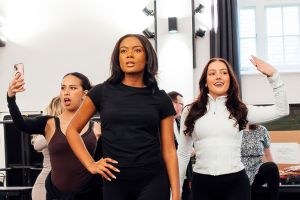The Party Girls at Canterbury’s Marlowe Theatre and on tour – review
Amy Rosenthal’s world premiere play marks the inaugural show from Marlowe Theatre Productions

Are the dark days of fascism truly over? Passing roundabouts marked with the St George’s Cross on the way to Kent’s Marlowe Theatre certainly sets the stage for its debut large-scale touring production, The Party Girls.
Based on the lives of the infamous Mitford sisters, it explores the complex relationships between society ‘sibs’ Nancy, Diana, Unity, Jessica and Deb (Pamela is alluded to but doesn’t feature here).
Amy Rosenthal’s sharp script romps along at a steady pace set by Richard Beecham’s able direction. For the opening scene we arrive in Washington DC. It’s 1942 and protagonist Decca (Jessica) Mitford is outside a communist supper-club chatting away to Czech-Jew son-of-refugees, Bob Treuher – a solid turn delivered by Joe Coen.
Emma Noakes’ Decca is a mix of forthright, stiff-upper-lip, rebel rouser with a hint of vulnerability seen most closely with scenes set in America with future husband Bob, as she grapples with the loss of first husband and comrade, Esmond.
From here the play transitions back and forth across decades from the 1930s to 1960s, which is facilitated by Simon Kenny’s compelling set design. That said, the shunting between scenes, signposted by occasionally booming bursts of music, is at times clunky – interrupting the flow of some wonderful interplay which could have benefitted with more time.
The most compelling scenes feature the sisters together at their childhood home in Oxfordshire, and in 1960s France where Pursuit of Love author, Nancy, is dying at home in Versailles.
Childhood monikers and idioms peppered through Rosenthal’s script are a love letter to the sisters’ once thick-as-thieves bond – which is powerful enough to support reconciliatory moments as we whizz back and forth through the decades.
In 1930s Swinbrook, the individual characters of the Mitford medley with their cut-glass accents and waspish waists are occasionally hard to discern. The one exception is Unity, whose physical presence and manic devotion to Hitler is undercut by a penchant for silliness and sisterly love, illuminated deftly by Ell Potter.
Etching swastikas with her diamond ring and rucking with ‘Bolshie’ communist-supporting Decca, the political flags set either side of the stage mark the developing chasm between the sisters. Horse-loving ‘hon’ Deborah Mitford – ably played by Flora Spencer-Longhurst – is located in the middle, as they discuss clothes, make-up and manicures.
Indeed, fashion and fascism are constant themes throughout The Party Girls. As the black shirted Unity devotes her life to Hitler, the so-called Aryan pin-up, Diana is infatuated by British fascist Oswald Moseley.
Nancy, later chatting with Deborah about her role in Diana’s incarceration during the war, recalls the government’s analysis: “she’s a very dangerous woman” at the same time describing how well she has aged.
Kirsty Besterman’s sterling performance as the comically snooty Nancy is a welcome respite to the heavier themes as she likens sister Decca’s appearance to a “dowdy wife in a Cornflakes commercial.”
The Party Girls is definitely a play for these increasingly polarised times – an enjoyable but occasionally disjointed production with some frustratingly underdeveloped scenes. Solid acting and a punchy script are more than enough to keep us entertained.















